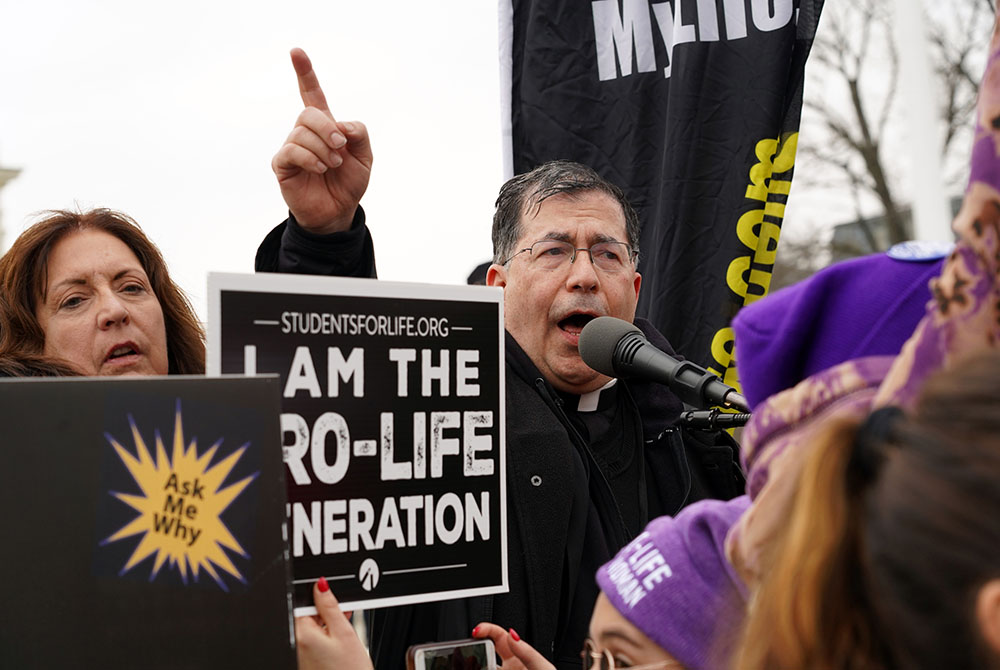
Fr. Frank Pavone, national director of Priests for Life, speaks in front of the U.S. Supreme Court during the 47th annual March for Life in Washington Jan. 24. (CNS/Gregory A. Shemitz, Long Island Catholic)
April saw the rapid spread of efforts by the Trump campaign to mobilize U.S. Catholics in the push to reelect President Donald Trump. Bookending the month were the April 2 online launch of the Catholics for Trump coalition and an April 25 conference call with Trump and over 600 people, including New York's Cardinal Timothy Dolan and several Catholic leaders.
Dolan spent much of the next couple weeks warding off criticism — including from NCR — over his uncritical praise of President Trump on that call. But it was the earlier event, the Catholics for Trump launch, that centrally featured another New Yorker, a familiar face to Catholics, especially those active in pro-life circles, and someone whose praise of Donald Trump over the last four years has been not only uncritical but rhapsodic: Fr. Frank Pavone of Priests for Life.
Pavone, 61, is no stranger to controversy. His rhetoric and tactics through the years have drawn criticism, and his leadership of Priests for Life — an operation that earned about $13.2 million in total revenue in both 2016 and 2017, according to to Form 990 tax documents for those years — has brought him into conflict with U.S. bishops (including Dolan). In 2016, he appeared in a livestreamed video in which he placed the body of an aborted fetus on an altar, a move that drew condemnation from Catholics over his treatment of human remains. The video, urging opposition to candidate Hillary Clinton in that year's presidential election, embodied the core of Pavone's decadeslong activism, which, politics aside, he distills down to four words: "You don't kill babies."
Pavone now does frequent webcasts from his Florida-based national headquarters, with Trump's photo often visible in the shot. "We're doing something that I think the church wants to do, which is to speak the teachings and the value of the church into the world of politics," Pavone told NCR. Seeing the Trump campaign from the inside, he paints a picture that belies the outward chaos of Trump himself. "They're so well organized," he said of his involvement with the campaign and its aggressive outreach to various coalitions, including pro-lifers and Catholics.
The admiration is mutual, as the Trump campaign recognizes what an asset Pavone is. Mercedes Schlapp, senior advisor for strategic communications, said in a comment relayed via email, "Through his steadfast pro-life advocacy and outpouring of support for the Catholic community, Father Pavone remains one of President Trump's most meaningful allies."
Pavone's advocacy for Trump is nothing new, having enthusiastically endorsed Trump's 2016 bid for the White House. The visual pairing of the Roman collar and the red "Make America Great Again" hat make him virtually a mascot for Catholics casting their lot with the man who is now president. But this posture is also a source of concern for Catholics and pro-lifers alike, who cite major disconnects between the church's witness in the public square and Pavone's embrace of Trump.
"I'm quite sure his heart is in the right place. And he's got the right views on the central question," said Charles Camosy, an associate professor of theology at Fordham University, via email. "But it is hard to quantify just how badly the pro-life movement has been damaged by uniting so uncritically to Trump. At least in the long term. And Father Pavone is at the heart of that."
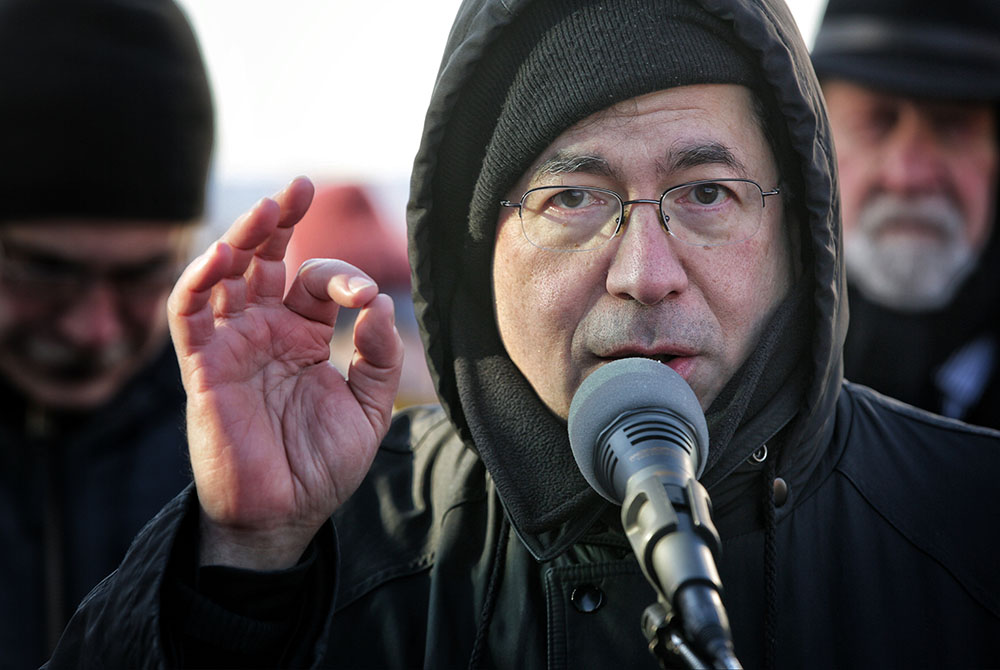
Fr. Frank Pavone, national director of Priests for Life, speaks during a prayer and protest rally outside of the new Planned Parenthood building in Washington Jan. 21, 2016, the day before the annual March for Life. (CNS/Lisa Johnston, St. Louis Review)
Man of the movement
Pavone is a native of Port Chester, New York, a village in Westchester County bordering Connecticut. He recounts his earliest recollections of political engagement as playing out in his childhood, as he and his younger brother tuned in the national party conventions of the '70s and the Watergate proceedings. In the seminary, he attended the worship service of a different non-Catholic denomination each weekend, driven by an ecumenical sensibility that he believes prepared him well for his work in pro-life circles. According to Pavone, the pastor of the Baptist church in his hometown even invited him to preach at her Good Friday service one year, a liturgy attended by several of Pavone's fellow seminarians. She would later attend his first Mass.
Pavone was ordained a priest of the Archdiocese of New York in 1988 by Cardinal John O'Connor — a longtime and vocal proponent of the pro-life movement. An early turning point in Pavone's own advocacy for the unborn occurred when Fr. Lee Kaylor, founder of Priests for Life, asked him to take over the organization a couple years after its founding in 1991. After transferring to the Diocese of Amarillo, Texas, with the intention of founding an order of priests, Pavone found himself in conflict with two successive bishops — Bishop John Yanta, who shut down the order in 2007, and Bishop Patrick Zurek, who in 2011 forbade Pavone from traveling outside the diocese following a conflict over the financial transparency of Priests for Life. A subsequent Vatican-mandated restructuring of Priests for Life overseen by Cardinal Dolan, who asked the organization to undergo a forensic audit and establish an independent board, ended in 2014, when Dolan wrote to the U.S. bishops, declaring, "I am unable to fulfill [the Vatican's] mandate, and want nothing further to do with the organization."
Pavone insisted to NCR that he has deep respect for the hierarchy and that church structures and functions have been abused to disparage him. The New York Archdiocese and the Amarillo Diocese did not respond to inquiries for this story. The U.S. Conference of Catholic Bishops declined a request for comment. And following an April profile by Catholic News Agency inquiring whether Pavone was still a priest in good standing in Amarillo or elsewhere, Pavone sent the outlet an email that read, in part, "The Congregation for Clergy, after a thorough investigation, has declared that I am a priest in good standing. Whoever denies this, in any manner and in any forum, will be called to respond before the competent civil and canonical authorities." The Congregation for Clergy also did not respond to inquiries from NCR.
Despite this bruising history, Pavone still enjoys some unlikely allies, particularly in the pro-life movement, where he is regarded, however improbably, as a bridge builder. Terrisa Bukovinac, founder and executive director of the group Pro-Life San Francisco, is a self-described leftist, atheist, feminist pro-lifer, the kind of "whole life" activist whose approach — to say nothing of background — would seem at odds with Pavone's.
"We cannot win a social justice movement without people power," said Bukovinac. "Unity is required, and Father Frank knows that, 100 percent. He has put this on the line his entire career, and he will not give up." Bukovinac notes that even attaching himself to Trump "makes perfect sense" to her. "He's using Trump as a way to gain unprecedented interest in this topic."
Herb Geraghty, an atheist who espouses Cardinal Bernardin's "seamless garment" ethic through his work as director of outreach for the organization Rehumanize International, first encountered Pavone as the priest offering an unexpectedly warm welcome to him as a board member of the Pro-Life Alliance of Gays and Lesbians.
"We're coming at the issues from all angles," Geraghty noted of the diversity of the movement, adding that he considers Pavone a friend and colleague who has done good work for babies and "people like me." Pavone likewise considers Bukovinac and Geraghty friends with whom he would be more at ease sitting and conversing with than he would with many bishops. And, he adds, his willingness to seek out diverse voices and work alongside the LGBTQ community puts him, in this regard, to the left of much of the hierarchy.
"The more things you require people to agree on if they're going to accomplish a common task, the fewer people you're going to have. The fewer things you require them to agree on and the more focused — laser focused — your purpose is, the broader and more diverse is going to be the group of people you get together to do that one thing," Pavone told NCR.
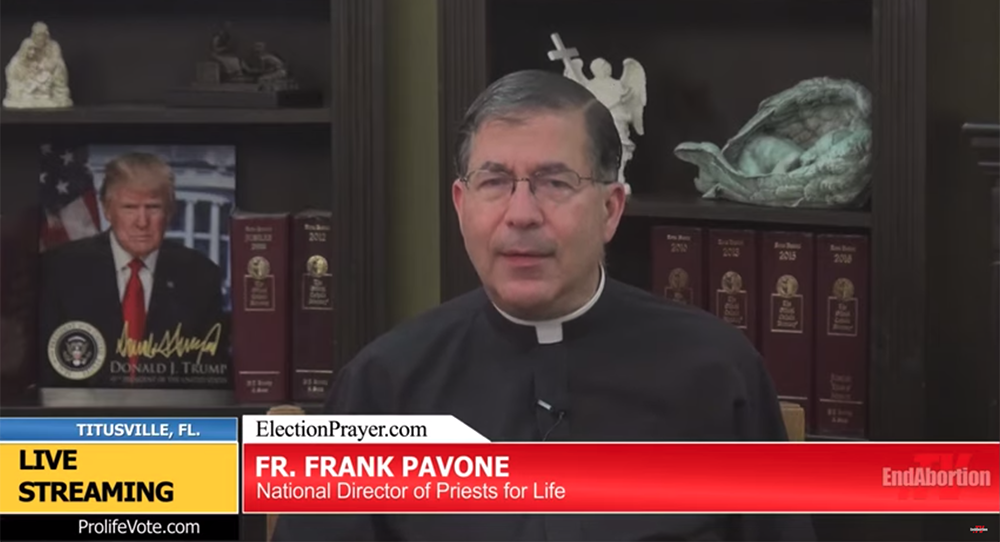
Screenshot of a YouTube video featuring Fr. Frank Pavone during a livestream May 4 (NCR photo/https://youtu.be/utDfsjZ1bNE)
Going full MAGA
This laser focus comes into play with the Trump campaign, where Pavone has made opposition to legal abortion the determining factor as to whether a candidate is anathema or unassailable. The embrace of Trump is one that Pavone's allies liken to the concession another pro-lifer or Catholic might make, for instance, in partnering with someone who supports Planned Parenthood while working on immigration reform.
But Camosy, who publicly left the Democratic Party because of its support for legal abortion, says there's no comparison.
"Pavone isn't cooperating on this or that issue with Trump and the GOP while keeping critical distance in other ways. For instance, he absorbed and defended the child separation policy at the border ... even when the USCCB itself has criticized it and called it a pro-life issue. That's just one example," Camosy said.
But Pavone doesn't see it that way, tweeting last July 19: "So much political hypocrisy when people complain about 'family separation' but fail to point out that if someone is breaking the law, being separated from their family is not the fault of those enforcing the law but of those who broke it! #Immigration #Catholic #KeepAmericaGreat."
Caravans of migrants from Latin America are another immigration-related issue that have led Pavone to embrace the rhetoric of Trump.
"Honest to God, I am really getting sick and tired of these caravans. What in the world is this? Just come and push your way into the country? And all of this just happening by itself?" Pavone tweeted on Jan. 15, 2019, going on to thank Trump for standing "against the un-American #Democrat party. #MAGA."
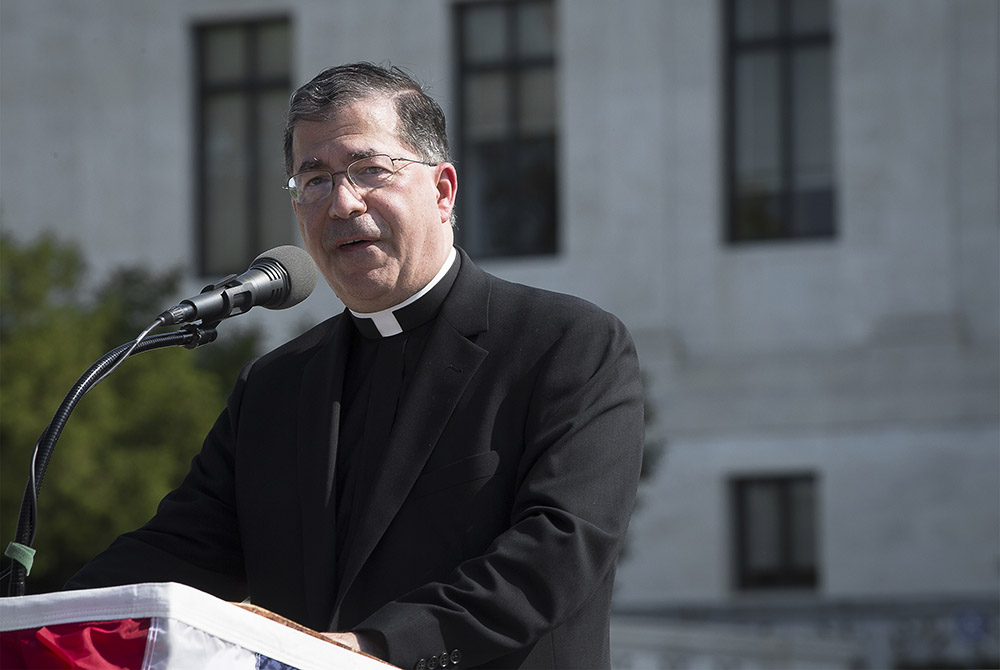
Fr. Frank Pavone, national director of Priests for Life, speaks in front of the U.S. Supreme Court in Washington Oct. 1, 2019, after a petition with more than 250,000 signatures calling for Roe v. Wade to be overturned was presented to the court. (CNS/Tyler Orsburn)
On their shared appreciation for brashness and shock value, via Twitter or otherwise, Pavone said he hears people say in conversation, "Father Frank is bringing into the church world what Donald Trump has brought into politics."
Not everyone in the pro-life movement or the church welcomes this point.
"I have very major disagreements with Father Frank," said Geraghty, who suspects that his friend's vocal support is about feeding the president's ego. And, through it all, "I know he's doing that because he supports the unborn. … I am willing to work with him on things other than electing President Trump."
Camosy is less accommodating: "His uncritical support of Trump — even using Trump's vile language and euphemisms — makes the very people we need to convince to join us to protect and support vulnerable human life dramatically less likely to do so."
Cathleen Kaveny, a theology and law professor of Boston College, regards Pavone as "an increasingly marginal figure" in the church and notes that extreme rhetoric, in the tradition of a Fr. Charles Coughlin, tends "to shore up … people who are already a narrow group of true believers. And those people tend to give money." She added, "I don't think they're all supporting Trump for pro-life reasons," citing anti-immigrant and economic policies.
Pavone places his policy advocacy squarely along the divide of whether a Catholic moral principle allows for legitimate disagreement in its policy application — here he cites poverty and immigration — or if a principle that is itself the policy, which is how he frames defense of unborn life. But Kaveny says this dichotomy isn't reflective of what Pope St. John Paul II was trying to accomplish with his 1995 encyclical Evangelium Vitae ("The Gospel of Life"), a text Pavone claims is foundational in his work.
"There wasn't a whole lot of difference between Bernardin" and John Paul's thought, Kaveny said, noting that the pope was trying to move perceptions of abortion from the realm of personal sin to a social ethic. "That program got hijacked" by the culture wars, Kaveny added. "There was a convergence in Catholic teaching that got ripped apart by American politics."
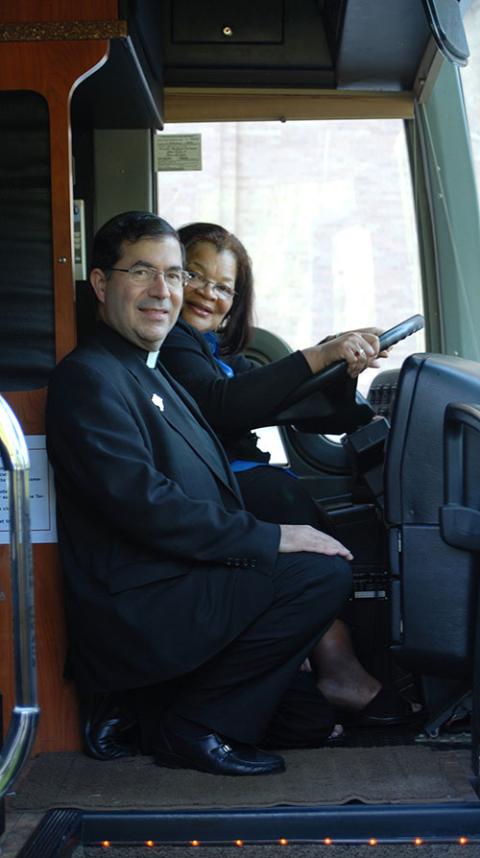
Father Frank Pavone, national director of Priests for Life, and Alveda King, director of African-American outreach at Priests for Life and niece of late civil rights leader the Rev. Martin Luther King Jr., pose in the Freedom Ride Bus in Birmingham, Alabama, in this April 26, 2010, file photo. (CNS/Priests for Life)
Gains vs. costs
A quarter century later, a Latin American pope has spent his pontificate speaking out on behalf of migrants, raising care for the environment to unprecedented moral weight and even explicitly warning against the allure of strongmen who exploit societal unrest by pinning blame on a "non-neighbor." Yet Pavone is unequivocal in his support for both Trump the man and the policy gains under this administration.
"It's the Emmaus experience: 'Were not our hearts burning within us as he spoke to us?' President Trump accomplishes that," Pavone told NCR, citing Trump as an inspirational speaker when he speaks about the greatness of America. "We're not going to be taken advantage of anymore — I mean, that's a Catholic value! … And he talks about it in the way that American people are talking about it in their living rooms."
John Gehring, contributor to NCR and Catholic program director at Faith in Public Life, a progressive advocacy group in Washington, notes that this is not an articulation of Catholic values: "Trump's ugly nativism and nationalist policies are radically out of step with a Catholic understanding of the global common good," Gehring said. "The entire construct of 'America First' is anathema to how Catholic teaching asks us to see our interconnectedness as people and as an international community. It's also a reactionary ideology with roots in white nationalism. You can try and defend that as a Republican if you want, but not as a Catholic."
But as with much of the U.S. political debate and Catholics, Pavone cites abortion, particularly an exchange on late-term abortion in the third 2016 presidential debate with Hillary Clinton, as a turning point in the narrative. Trump said in that exchange: "Now, you can say that that is OK and Hillary can say that that is OK, but it's not OK with me."
"Well that's exactly what the average pro-life American is thinking," Pavone told NCR, adding that Trump has since done "everything in his executive power to take money away from the abortion industry, especially money that was coming out of our pockets."
This has included, he notes, expanding the Mexico City Policy, forcing Planned Parenthood out of Title X, strengthening the ability of states to funnel money away from abortion, more robust enforcement of protections in law for those who don't want to work in abortion, stopping internal government funding for fetal tissue research and promoting ethical review for would-be government contractors who might conduct fetal tissue research.
For Destiny Herndon-De La Rosa, founder of the pro-life organization New Wave Feminists, this list is unpersuasive because of how the alignment with Trump sets back the decadeslong struggle to undo perceptions of the pro-life movement as being anti-woman.
"It is not a mindset we're going to change by aligning with someone who degrades women," she said. "I have not seen Trump do anything that actually makes it easier for women to choose life." Herndon-De La Rosa grew up Protestant and was horrified, during the 2016 campaign, to see the people who'd instilled her the moral values in her turn to Trump as a savior figure. The ensuing crisis of faith has led her to self-identify as agnostic.
Herdon-De La Rosa, whose organization was disinvited from the first Women's March in 2017 over their pro-life stance, draws a comparison to aging feminists who turned a blind eye to former president Bill Clinton's misdeeds in their desire to elect Hillary Clinton as a woman president in their lifetimes.
"I think the same thing happened for a lot of pro-lifers, where they're older, they've been saying since 1973 that 'Roe is not going to survive me. I'm going to be part of overturning this,' " she said. "Now you're locked into this very bad decision, and you're going down with this ship."
Conversely, Pavone sees the choice to support Trump as existential. "If he weren't where he is, we wouldn't be where we are, because he literally saved us from incurring crippling fines from our own government — fines that we would have incurred for living out the demands of our faith," he said, in reference to the Department of Health and Human Services' contraceptive mandate put in place by the Obama administration. "It was only the election of the president that took that mandate away, and … I don't think Catholics can afford to forget this."
Advertisement
Steven Millies, associate professor of public theology and director of the Bernardin Center at Catholic Theological Union in Chicago, calls this rationale a perverse caricature. "I would not be cheerful for a bishop to be persuaded that he should hold any political position bearing on the rights of other Americans who do not share our faith only because of his diocese's bottom line," Millies said.
And where Pavone sees alliance with Trump protecting the church's institutional well-being, others cite concern for the long-term well-being of the pro-life movement. Herndon-De La Rosa sees him and other pro-lifers engaged in a strategy that aims for the lowest possible bar — zero-sum policy gains for the unborn that don't foster a wider culture of life.
"It's the only thing they could imagine doing," she said. "I don't think he's a horrible monster. I think he's somebody who's fought a very good fight for years, and it has made him a bit unhinged and fanatical when it comes to the unborn. Which I don't think is a bad thing. I think that we should all be a bit fanatical when it comes to defending human life inside the womb."
[Don Clemmer is a former staffer of the U.S. Conference of Catholic Bishops. He writes from Indiana and edits Cross Roads magazine for the Catholic Diocese of Lexington. Follow him on Twitter: @clemmer_don.]







